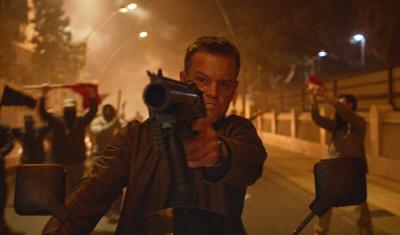For American audiences, this movie franchise satisfies whatever espionage thrills and action bursts that lovers of James Bond might thirst. It has all the seriousness and brooding of the recent Daniel Craig embodiment of Bond, yet Craig seemed like he had a bit more fun. The only fun here is the sadistic jolt some might get from watching a very muscular Matt Damon punch an even more muscular guy in the face and instantly knock him unconscious. Director and co-writer Paul Greengrass tries to inject some relevant and intellectual scenes in this film that make it more than just the endless chasing that most action films are. Yet, those so-called relevant and intellectual scenes feel superfluous or like padding in between the foot and car chases and Damon flexing and swinging his upper body in order to beat people up.
That being said, the action here is boring. It’s nothing like the inventive and exciting sequences in something like Mission: Impossible – Rogue Nation. Bourne just walks around and punches people. The only, well-done sequence is an adrenaline rush down the Las Vegas Strip with a SWAT vehicle acting like a tank and plowing through every car in its path. It was a moment out of Fast Five or the subsequent sequels that are just car chase porn.
Oscar-winner Alicia Vikander (The Danish Girl and Ex Machina) co-stars as Heather Lee, a cyber-security expert in the CIA who is put in the lead of finding Jason Bourne after his friend hacks into the CIA’s computers and steals confidential material regarding Bourne’s history and what happened to his father. She’s comparable to Emily Blunt’s character in Sicario or maybe Jessica Chastain’s character in Zero Dark Thirty, meaning a lone woman in a workplace surrounded by men against whom she has to push back to prove herself or to prove a point. She’s the only one who’s really on the side of Bourne.
Greengrass’ film never really develops her like in Sicario or Zero Dark Thirty. As far as female spies or CIA agents go, Claire Danes in Homeland still stands as the most interesting. Vikander here is rather bland and un-engaging, another boring action figure but with certainly not as much action as Damon. She’s mostly just behind computer monitors.
The only interesting performance comes from Vincent Cassel (Black Swan and Mesrine), a French actor who plays an older counterpart to Bourne, a mirror of what Bourne could have become. Cassel can do action effortlessly. He’s very smooth and sexy, and his relationship with Tommy Lee Jones who plays the CIA Director Robert Dewey was intriguing. Seeing Cassel and Jones interact on screen made me sit up and take notice. It didn’t put me to sleep like the rest of the movie.
The film did have potential with the inclusion of Riz Ahmed (Four Lions and Nightcrawler) who plays Aaron Kalloor, a Mark Zuckerberg or young, Bill Gates-type. Aaron has developed a new platform for users everywhere. His company, Deep Dream, apparently is a very popular tech firm, not only in the United States but worldwide.
The U.S. government as represented by Robert Dewey wants back-door access to Aaron’s platform. Robert in fact goes to Aaron and attempts to blackmail him with supplying the government with that back-door, but Aaron sees it as a gross invasion of privacy to every and all of his users. It’s reminiscent of the fight between Tim Cook, the CEO of Apple, Inc. and the FBI.
In December 2015, 14 people were killed and 22 were injured in a terrorist attack in San Bernardino, California. Two months later in February 2016, the FBI announced that it couldn’t break into the cell phone of one of the terrorists, Syed Rizwan Farook. The FBI asked the NSA but they couldn’t do it. The phone was an Apple iPhone 5C. The FBI then asked Apple to create a back-door and Cook said no. It sparked a country-wide debate over national security and technological privacy.
With the tête-à-tête between Robert and Aaron in this movie, that same debate is invoked, but there is no equivalent to Farook in this movie. There is a character who is a little like Edward Snowden, but he’s more of a straw-man. Greengrass sets up this debate and these men as totems but doesn’t really go anywhere with them.
The whole thing just becomes a hollow pursuit of revenge, reinforcing the myth of redemptive violence and that physical aggression is the preferred expression of masculinity. The final message ends up being that mistrust of government should be the default setting. Bourne would have fit right in at the Republican National Convention in Cleveland this year, right along side Donald Trump.
Two Stars out of Five.
Rated PG-13 for intense sequences of violence and action, and brief strong language.
Running Time: 2 hrs. and 3 mins.






















